| . |
Jimmy Reed (Mathias James Reed) was one of the most influential bluesmen of the post-World War II period. With a blues style that was rhythmically relaxed and uncommonly accessible, Reed sold more records in the 1950s and early 1960s than any other blues artist save B.B. King. His "sweet" style of blues, rooted in traditional Delta groundwork, made its mark on listeners, both black and white, and had a profound effect on rock groups such as the Rolling Stones and solo artists like Bob Dylan.
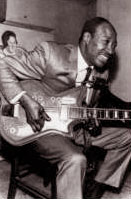 Where Muddy Waters and Howlin' Wolf confronted their listeners with gritty, urgent blues, Reed was more apt to stroke them with laid-back blues grooves that hit a responsive chord almost instantly. It's no surprise that Reed was able to cross over regularly onto the pop charts. With non-threatening vocals, gentle harmonica riffs, and walking bass passages, Jimmy Reed and his blues were downright difficult not to like. Where Muddy Waters and Howlin' Wolf confronted their listeners with gritty, urgent blues, Reed was more apt to stroke them with laid-back blues grooves that hit a responsive chord almost instantly. It's no surprise that Reed was able to cross over regularly onto the pop charts. With non-threatening vocals, gentle harmonica riffs, and walking bass passages, Jimmy Reed and his blues were downright difficult not to like.
A big chunk of credit for Reed's success must go to guitarist Eddie Taylor, his near-constant companion and the creator of the rhythms that fueled Reed's blues, and to Reed's wife, Mary Lee "Mama" Reed, who wrote many of his songs. Yet it was Reed who delivered the goods. It was he who set the feel of the songs and projected the warmth and the easy flow that made the Jimmy Reed repertoire so distinctive and popular.
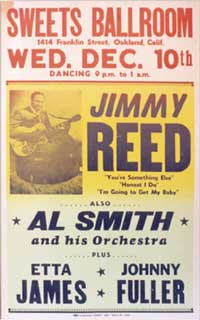 Reed was born September 26, 1925 in Dunleith, Mississippi. It is this beginning that provided the exposure to the Blues. His tools for the blues were a Harmonica, Guitar and his pleading, boasting, chuckling or threatening voice. Reed's simple but evocative sound of walking bass lines mixed with high and slow harp did develop that unique, stacatto style, a blowing style with a lot less suck than someone such as Little Walter or Sonny Boy Williamson. Reed was born September 26, 1925 in Dunleith, Mississippi. It is this beginning that provided the exposure to the Blues. His tools for the blues were a Harmonica, Guitar and his pleading, boasting, chuckling or threatening voice. Reed's simple but evocative sound of walking bass lines mixed with high and slow harp did develop that unique, stacatto style, a blowing style with a lot less suck than someone such as Little Walter or Sonny Boy Williamson.
back to bluesman
EddieTaylor, boyhood friend, taught Reed the rudiments of the guitar. Reed moved to Chicago in 1943; shortly thereafter he was drafted and served in the navy until the end of World War II. After he was discharged, Reed returned to Chicago, but then moved to nearby Gary, Indiana. In 1949 he teamed up with old chum Taylor who had recently moved to Chicago, and the two began playing small clubs: Reed on guitar, harp, and vocals, and Taylor on guitar. The Chess Label turned Jimmy down in 1953, but he was directed to the Vee-Jay Label by Albert King whos own career was just starting. He is one of the first to have "cross-over" success into the white market, and subsequently (13 times) Jimmy's singles made their way into the Hot Hundred. Jimmy Reed to say the lest had a a lot of trouble with the bottle, however he was not the first nor the last to encounter such difficulties after all it is part of life.
After serving in the Navy during the war he moved to Chicago, and worked in the Steel mills. It was in the early 50's that he hooked up with his old friend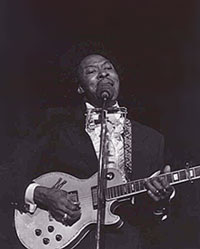 Eddie Taylor. His signature is easy to spot, the shrill harmonica, boogie rhythm, Eddie Taylors guitar fills and the drum beat and of course his wonderful voice. Eddie Taylor. His signature is easy to spot, the shrill harmonica, boogie rhythm, Eddie Taylors guitar fills and the drum beat and of course his wonderful voice.
Reed's declined in the 60's is directly in line with the fall of Vee-Jay. He did manage to to produce some decent tracks for the next 10 years. He wasn't around for a few years and was hoping to record again but died of a heart attack in 1976. And as John Collis says in his liner notes, "Reed crammmed in plenty of sessions during his great decade. Though no-one could claim that every track was a masterpiece, the standard was remarkably high. Jimmy Reed was a giant of the Blues"
|
. |
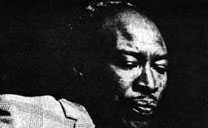

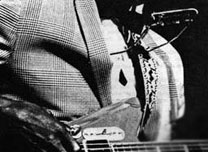
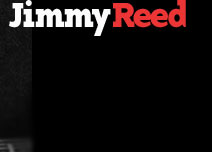
 Where Muddy Waters and Howlin' Wolf confronted their listeners with gritty, urgent blues, Reed was more apt to stroke them with laid-back blues grooves that hit a responsive chord almost instantly. It's no surprise that Reed was able to cross over regularly onto the pop charts. With non-threatening vocals, gentle harmonica riffs, and walking bass passages, Jimmy Reed and his blues were downright difficult not to like.
Where Muddy Waters and Howlin' Wolf confronted their listeners with gritty, urgent blues, Reed was more apt to stroke them with laid-back blues grooves that hit a responsive chord almost instantly. It's no surprise that Reed was able to cross over regularly onto the pop charts. With non-threatening vocals, gentle harmonica riffs, and walking bass passages, Jimmy Reed and his blues were downright difficult not to like. Reed was born September 26, 1925 in Dunleith, Mississippi. It is this beginning that provided the exposure to the Blues. His tools for the blues were a Harmonica, Guitar and his pleading, boasting, chuckling or threatening voice. Reed's simple but evocative sound of walking bass lines mixed with high and slow harp did develop that unique, stacatto style, a blowing style with a lot less suck than someone such as Little Walter or Sonny Boy Williamson.
Reed was born September 26, 1925 in Dunleith, Mississippi. It is this beginning that provided the exposure to the Blues. His tools for the blues were a Harmonica, Guitar and his pleading, boasting, chuckling or threatening voice. Reed's simple but evocative sound of walking bass lines mixed with high and slow harp did develop that unique, stacatto style, a blowing style with a lot less suck than someone such as Little Walter or Sonny Boy Williamson. Eddie Taylor. His signature is easy to spot, the shrill harmonica, boogie rhythm, Eddie Taylors guitar fills and the drum beat and of course his wonderful voice.
Eddie Taylor. His signature is easy to spot, the shrill harmonica, boogie rhythm, Eddie Taylors guitar fills and the drum beat and of course his wonderful voice.